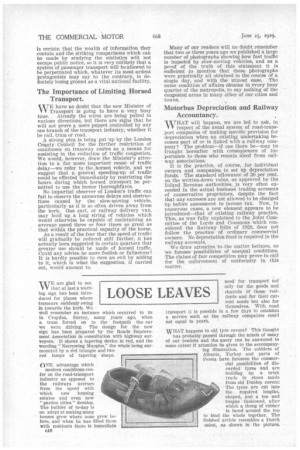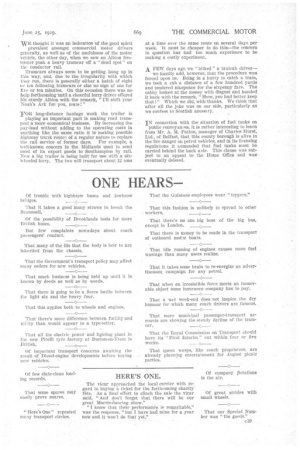W E are glad to see that at last a warnin g
Page 40

Page 41

If you've noticed an error in this article please click here to report it so we can fix it.
sign has been introduced for places where tramcars suddenly swing in towards the kerb. We *ell remember an instance which occurred to us in Croydon, Surrey, many years ago, when a tram forced on to the footpath the car we were driving. The design for the new sign has been prepared by the Roads Improvement Association in consultation with highway surveyors. it shows a tapering device in red, and the wording "Narrowing Margins," the whole being surmounted by a red triangle and two red lamps of tapering shape.
ONE advantage which
modern conditions confer on the road-transport industry as opposed to the railways accrues from the speed with which new housing estates and even new "garden cities" develop. The builder of to-day is an adept at making many houses grow where none grew before, and when he has filled them With residents there is immediate
e18 need for transport not only for the goods and chattels of those residents and for their curd rent needs but also for themselves. With road transport it is possible in a few days to establish a service such as the railway companies could not equal in year.
WHAT happens to old tyre covers? This thought has probably passed through the minds of many of our readers and the query can be answered to some extent if attention be given to the accompanying illustration. The cobblers of Albania, Turkey and parts of Persia have foreseen the cot/linerdal possibilities of discarded tyres and are building up a brisk trade in shoes made from old Dunlop covers: The tyres are cut into the required lengths, shaped, and a toe and tongue fashioned, after which a thong of rubber is laced around the top to bind the whole together. The finished article resembles a Dutch sabot, as shown in the picture. WE thought it was an indication of the good spirit prevalent amongst commercial . motor drivers generally, as well as of the usefulness of the motor vehicle, the other day, when we saw an Albion five-. tonner push a heavy tramcar off a " dead spot" on the conductor rail.
Tramcars always seem to be getting hung up in this way, and, 'clue to. the irregularity with which they run, there is generally either a batch of eight or ten following tramcars or else no sign of one for five or ten minutes. On this occasion there was no help forthcoming until a cheerful lorry driver offered his sturdy Albion with the remark, "I'll shift your Noah's Ark for you; mate!"
-FOR long-distance haulage work the trailer is playing an important part in making road transport a more economical business. By increasing the pay-load without adding to the operating costs in anything like the same ratio it is making possible highway trunk route a of a regular nature to replace the rail serVice of former days. For example, a well-known concern in the Midlands used to send most of its export goods to Southampton by rail. Now a big trailer is being built for use with a sixwheeled lorry. The two will transport about 12 tons
at a time over the same route on several days per week. It must be cheaper to do this—the concern in question has had too much experience to be making a costly experiment.
A FEW days ago we. " bilked" a taxicab driver—
we hastily add, however, that the procedure was forced upon us. Being in a hurry to catch a train, we took a cab a distance of a few hundred yards and tendered nitiepence for the sixpenny fare. The cabby looked at the money with disgust and handed it back with the remark, "Here, you had better keep that!" Which we did, with thanks. We think that after all the joke was on our side, particularly as we confess to Scottish ancestry.
IN connection with the situation of fuel tanks on public conveyances, it is rather interesting to learn from Mr. A. M. Patton, manager of Charles Hurst, Ltd., of Belfast, that this county borough is alive to the fire danger on petrol vehicles, and in its licensing regulations it Gemancled that fuel tanks must be carried behind the back axle. This clause was subject to an appeal to the Home Office and was' eventually deleted.












































































































